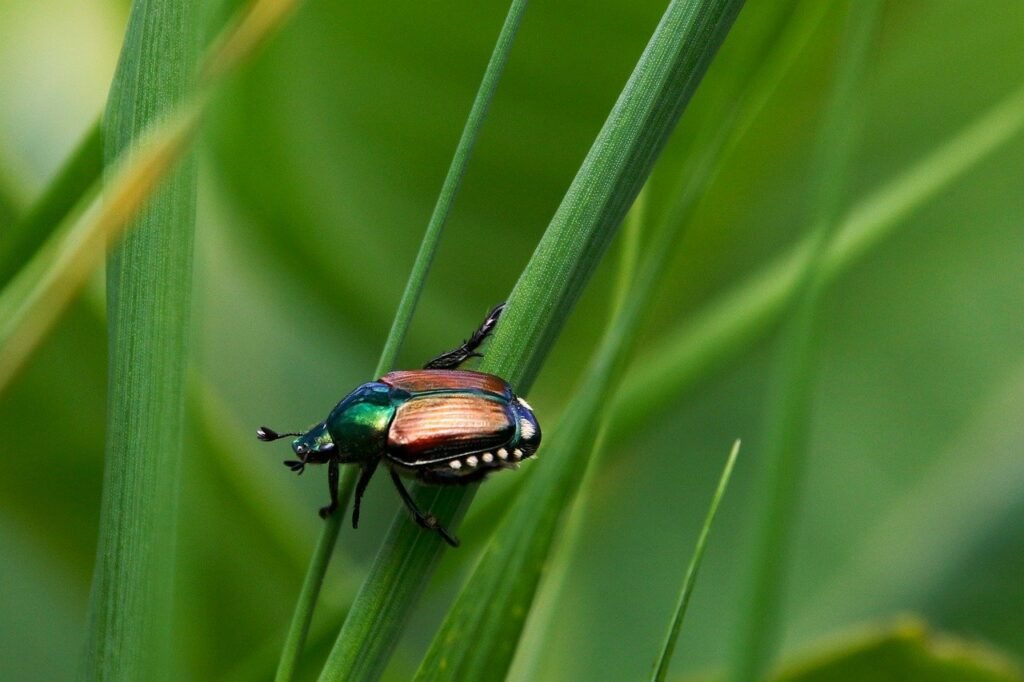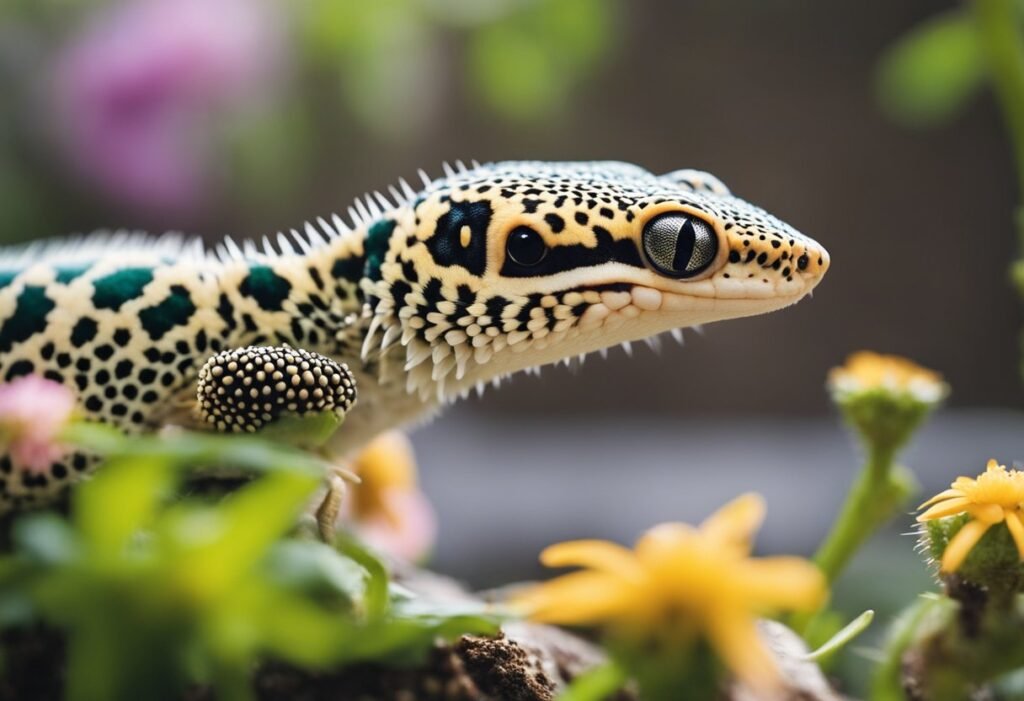Leopard geckos are fascinating creatures that make great pets. They are known for their unique appearance, docile nature, and ease of care. However, as with any pet, it’s important to ensure that they are receiving a well-balanced diet. One question that often comes up is whether leopard geckos can eat Japanese beetles.
Japanese beetles are a common garden pest that can cause significant damage to plants. They are also known to be a good source of nutrition for some animals. While leopard geckos are primarily insectivores, it’s important to be cautious about what insects they are fed. In this article, we will explore whether Japanese beetles are safe for leopard geckos to eat and what nutritional value they provide.
Leopard Gecko Dietary Basics
Leopard geckos are insectivores, which means they require a diet consisting primarily of insects. In the wild, they feed on a variety of insects, including crickets, mealworms, waxworms, and roaches. In captivity, it is important to provide a varied diet that meets their nutritional needs.
Nutritional Requirements
Leopard geckos require a balanced diet that includes protein, fat, and carbohydrates. They also require vitamins and minerals to maintain their health. The following table outlines the nutritional requirements of leopard geckos:
| Nutrient | Requirement |
|---|---|
| Protein | 20-30% of diet |
| Fat | 10-15% of diet |
| Carbohydrates | 5-10% of diet |
| Calcium | 2:1 calcium to phosphorus ratio |
| Vitamin D3 | Required for calcium absorption |
Common Prey and Supplements
Crickets and mealworms are the most common prey items for leopard geckos. It is important to gut-load these insects with a nutritious diet before feeding them to your gecko. This ensures that your gecko receives the necessary vitamins and minerals from their prey.
In addition to gut-loading, it may be necessary to dust your gecko’s food with supplements. Calcium and vitamin D3 are essential for maintaining healthy bones and preventing metabolic bone disease. It is important to use a calcium supplement that includes vitamin D3, as this helps with calcium absorption.
While leopard geckos can eat a variety of insects, it is important to avoid feeding them insects that are toxic or difficult to digest. Japanese beetles, for example, are not recommended as they may contain pesticides or other harmful substances. Stick to feeding your gecko a varied diet of gut-loaded crickets, mealworms, and other safe insects to ensure they receive the necessary nutrients for good health.
Japanese Beetles as Food

Leopard geckos are known to have a diverse diet, and they can eat a variety of insects. One of the insects that leopard geckos can eat is the Japanese beetle. In this section, we will discuss the nutritional profile and potential risks of feeding Japanese beetles to leopard geckos.
Nutritional Profile
Japanese beetles are a good source of protein for leopard geckos. They contain about 20% protein, which is essential for the growth and maintenance of the gecko’s body. They also contain a small amount of fat, which provides energy for the gecko.
In addition to protein and fat, Japanese beetles also contain some vitamins and minerals that are important for leopard geckos. For example, they contain calcium, which is necessary for the gecko’s bone health. They also contain vitamin A, which is important for the gecko’s vision and immune system.
Potential Risks
While Japanese beetles can be a nutritious food source for leopard geckos, there are also some potential risks to consider. One of the main risks is the possibility of pesticide contamination. Japanese beetles are often treated with pesticides, which can be harmful to leopard geckos if they consume the beetles.
Another risk is the possibility of choking. Japanese beetles have hard exoskeletons that can be difficult for leopard geckos to digest. If the gecko eats too many beetles or chews them improperly, they may become impacted and suffer from digestive problems.
In conclusion, Japanese beetles can be a good source of nutrition for leopard geckos, but it is important to take precautions to avoid pesticide contamination and choking. As with any new food, it is best to introduce Japanese beetles slowly and monitor the gecko’s response to ensure that they are tolerating the food well.
Feeding Practices
Feeding Frequency
When it comes to feeding leopard geckos, it is important to establish a consistent feeding schedule. We recommend feeding adult leopard geckos 2-3 times per week, while juveniles should be fed daily. It is important not to overfeed your leopard gecko, as this can lead to obesity and other health issues.
Portion Sizes
The portion size for a leopard gecko should be appropriate for their size and age. As a general rule, a portion size should be no larger than the space between the gecko’s eyes. We recommend feeding adult leopard geckos 3-5 appropriately sized insects per feeding, while juveniles should be fed 5-10 appropriately sized insects per feeding. It is important to ensure that the insects are gut-loaded and dusted with calcium and vitamin supplements before feeding to ensure proper nutrition.
When it comes to feeding leopard geckos Japanese beetles, it is important to note that these insects are not a part of their natural diet. While leopard geckos may eat Japanese beetles if offered, we do not recommend feeding them as a regular part of their diet. It is important to provide a variety of appropriately sized insects, such as crickets, mealworms, and dubia roaches, to ensure a balanced and nutritious diet for your leopard gecko.
Identifying Safe Insects
When it comes to feeding leopard geckos, it is important to ensure that the insects we offer them are safe to eat. In this section, we will discuss how to identify safe insects for your leopard gecko.
Pesticides and Parasites
One of the most important factors to consider when selecting insects for your leopard gecko is the presence of pesticides and parasites. Insects that have been exposed to pesticides or that are carrying parasites can be harmful or even deadly to your gecko.
To avoid feeding your gecko contaminated insects, it is important to source your insects from reputable suppliers. You can also choose to raise your own insects at home using organic methods to ensure that they are free from harmful chemicals.
Another way to reduce the risk of feeding contaminated insects to your gecko is to gut-load them with nutritious foods. This will help to flush out any toxins or parasites that may be present in the insects.
Captive Bred vs Wild Caught
Another factor to consider when selecting insects for your leopard gecko is whether they are captive-bred or wild-caught. Captive-bred insects are generally considered to be safer for your gecko as they are less likely to carry parasites or diseases.
Wild-caught insects, on the other hand, may carry parasites or diseases that can be harmful to your gecko. Additionally, wild-caught insects may have been exposed to pesticides or other chemicals in their natural environment.
When selecting insects for your leopard gecko, we recommend choosing captive-bred insects whenever possible. If you do choose to feed your gecko wild-caught insects, be sure to properly quarantine and treat them before offering them to your gecko.
By following these guidelines, you can ensure that the insects you offer your leopard gecko are safe and nutritious, helping to promote their health and wellbeing.
Alternatives to Japanese Beetles

Commercially Available Feeder Insects
If you are looking for alternative feeder insects for your leopard gecko, there are many commercially available options. These insects are typically bred specifically for feeding to reptiles and are a great source of nutrition.
One popular option is crickets. Crickets are high in protein and are readily available at most pet stores. They are also relatively inexpensive, making them a great choice for feeding your leopard gecko.
Another option is mealworms. Mealworms are also high in protein and are available at most pet stores. They are also easy to breed at home if you prefer to raise your own feeder insects.
Dubia roaches are another popular option. They are high in protein and are easy to digest, making them a great choice for leopard geckos. They are also relatively easy to breed at home if you prefer to raise your own feeder insects.
Preparing Insects for Feeding
Before feeding any insects to your leopard gecko, it is important to prepare them properly. This will ensure that your leopard gecko is getting the proper nutrition and will help prevent any health issues.
First, make sure that the insects are gut-loaded. This means feeding them a nutritious diet for at least 24 hours before feeding them to your leopard gecko. This will ensure that your leopard gecko is getting the proper nutrition from the insects.
Second, make sure that the insects are properly dusted with calcium and vitamin supplements. This will help ensure that your leopard gecko is getting all of the necessary nutrients.
Overall, there are many alternatives to Japanese beetles that are great for feeding leopard geckos. By choosing the right feeder insects and preparing them properly, you can ensure that your leopard gecko is getting all of the necessary nutrition for a healthy and happy life.
Frequently Asked Questions
Are Japanese beetles safe for leopard geckos to consume?
It is not recommended to feed Japanese beetles to leopard geckos. These insects may contain harmful chemicals such as pesticides that can be harmful to your pet’s health. It’s important to ensure that the insects you feed your leopard gecko are safe and free from any harmful chemicals.
Which insects should be avoided in a leopard gecko’s diet?
Leopard geckos should not consume insects that are toxic or contain harmful chemicals. Insects such as fireflies, ladybugs, and beetles should be avoided. It’s important to research the insects you plan to feed your leopard gecko and ensure that they are safe for consumption.
What are the dietary hazards for leopard geckos when feeding them insects?
Feeding your leopard gecko insects that are too large can cause impaction, which is a blockage in the digestive system. Additionally, feeding your leopard gecko insects that are too small or not nutritious enough can result in malnutrition. It’s important to provide a balanced and varied diet to ensure your pet is receiving all the necessary nutrients.
Can consuming Japanese beetles harm leopard geckos?
Japanese beetles may contain harmful chemicals such as pesticides that can be harmful to leopard geckos. Consuming these insects can result in health problems or even death. It’s important to ensure that the insects you feed your leopard gecko are safe and free from any harmful chemicals.
What are the nutritional requirements for leopard geckos?
Leopard geckos require a balanced diet that includes a variety of insects such as crickets, mealworms, and waxworms. It’s important to provide a calcium supplement to prevent metabolic bone disease and ensure that the insects are gut-loaded with nutritious foods.
How do I identify if an insect is safe for my leopard gecko to eat?
Before feeding an insect to your leopard gecko, research the insect to ensure that it is safe for consumption. Avoid feeding insects that are toxic or contain harmful chemicals. It’s important to provide a varied and balanced diet to ensure your pet is receiving all the necessary nutrients.





